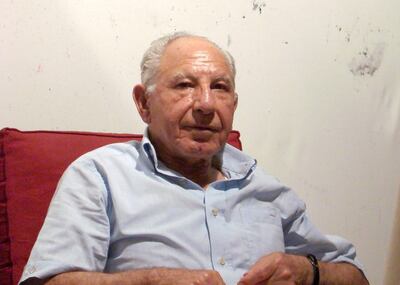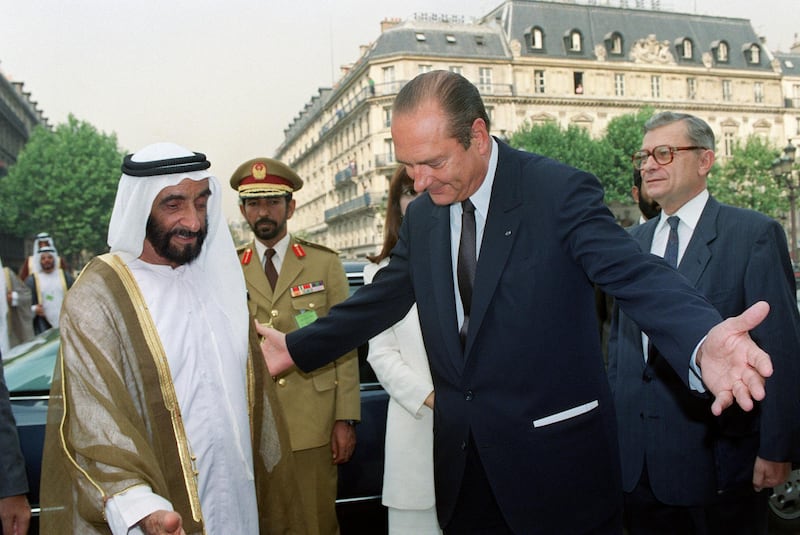Former French president Jacques Chirac often abandoned the cold logic of his realist foreign policy to champion human rights in the Levant, touched by brutality in cases with which he became familiar.
His humanist legacy will be associated with having secretly saved Syria’s most prominent dissident, Riad Al Turk, who had spent two decades in secret police dungeons under Assad family rule.
Chirac was president from 1995 to 2007. He died on Thursday, aged 86.
During preparations for a visit to Paris in 1998 by Hafez Al Assad, the late Syrian dictator, Chirac insisted that Turk be released, or the visit, crucial to burnishing Al Assad’s international image, would not happen.
Al Assad acquiesced and Mr Al Turk, now 89, was released in 1998 after 18 years as a political prisoner in a two-square-metre underground cell in Damascus.
French authorities received Mr Al Turk in Paris, where he had multiple surgeries to treat him from the effects of torture and incarceration, before he returned to Syria to resume his non-violent resistance to Assad.
Mr Al Turk's imprisonment was the subject of the 2001 film, Ibn El Am (Cousin) by Ali Atassi, whose father, the late Syrian president Nureddin Atassi, spent 22 years in a military jail in Damascus on the orders of Al Assad.

Without Chirac’s intervention Mr Al Turk, like many Syrian prisoners of conscience, would have been left to die in prison, or, like Nureddin Atassi, would have been released only once the authorities were certain death was imminent.
Chirac, and most Arab and western leaders, stayed away from Al Assad's funeral when he died in 2000.
He awarded Al Assad's son and successor, Bashar, the Legion d'Honneur in 2001. But that was before the current Syrian president cracked down later that year on the Damascus Spring, a non-violent forerunner to the Syrian revolution in 2011.
France stripped Mr Al Assad of the award last year, in response to his regime's crackdown on the 2011 revolt and its actions in the ensuing civil war.
Mr Al Assad had Mr Al Turk rearrested in September 2001 and Chirac, using France's influence as the Syrian leader's gateway to the West, once again managed to obtain his release after 15 months.
In neighbouring Lebanon, Chirac had a close personal friendship with the late Lebanese statesman Rafiq Hariri, who had increasingly fallen out of favour with the Syrian regime, finally joining calls for Mr Al Assad's forces to leave Lebanon in 2004.
Chirac had previously expressed tacit support the Syrian presence, declaring on several occasions that it was unrealistic to expect them to leave. But France, through Chirac, was instrumental in passing the 2004 UN resolution 1559, which de facto called on Mr Al Assad to pull his troops out of Lebanon, setting in motion a chain of events that led to the assassination of Hariri in February 2005 and the withdrawal of the troops after a 32 year presence.
Hariri’s killing sparked Lebanon's Cedar Revolution, the peaceful protests calling on the Syrian regime to leave, which France and the US supported, ultimately pressuring Mr Al Assad to pull out his forces.
Chirac was so incensed that his protege, Nicolas Sarkozy, led the European rehabilitation of Mr Al Assad that he boycotted the 2008 Bastille Day Parade in Paris in protest at the Syrian leader's presence.
Chirac also maintained strong ties between France and the Gulf, although he led European opposition to the 2003 US invasion of Iraq. He visited the UAE several times, meeting Sheikh Zayed in 1997 and President Sheikh Khalifa in June 2003.
Chirac sometimes irked Israel by his support for the Palestinian cause. In 2004, he flew Yasser Arafat to be treated in Paris. In a gesture of gratitude, Palestinian mourners raised pictures of Chirac at the PLO leader's funeral in Ramallah.
Mr Al Turk, the Syrian dissident, fled to France last year, having lived in hiding since the Syrian civil war broke out in 2011. He does not speak publicly about the factors that had led to his release, as the French authorities are keen to keep the diplomacy involved secret.
But in private, Mr Al Turk acknowledges his debt to Chirac. They might have never met, but adherence to nonviolence bonded them.






